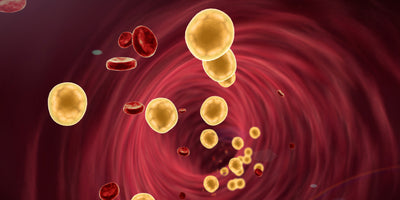
8 Reasons Why Hydration Can Improve Your Digestive Health
Staying hydrated is often lauded for its myriad health benefits, from enhancing skin health to boosting energy levels. However, one of the most significant, yet underappreciated, advantages of drinking enough water is its positive impact on digestive health. In this comprehensive guide, we'll explore eight compelling reasons why hydration is crucial for maintaining a healthy digestive system, offering insights that could transform your digestive health and overall well-being.
1. Enhancing Digestive Efficiency
Water: The Unsung Hero of the Digestive System
Digestive efficiency refers to how well our bodies can break down and absorb nutrients from the food we consume. Water plays a pivotal role in this process, acting as a solvent that helps dissolve fats, soluble fiber, and other components, making it easier for the body to process them. Moreover, water facilitates the movement of digestible components through the intestines, ensuring a smooth transition from ingestion to nutrient absorption.
A well-hydrated body can effortlessly dissolve minerals and nutrients, making them more accessible for absorption into the bloodstream. This not only maximises the nutritional benefits we receive from our food but also reduces the physical strain exerted during bowel movements, preventing conditions like hemorrhoids and anal fissures.
Practical Tips:
- Aim for at least 8 glasses of water a day, more if you're active or live in a hot climate.
- Incorporate water-rich foods into your diet, such as cucumbers, tomatoes, and watermelon, to help meet your hydration needs.
2. Preventing Constipation
The Role of Water in Bowel Regularity
Constipation is a common digestive issue that affects people of all ages, characterised by infrequent bowel movements and difficulty passing stool. Adequate hydration is a key preventative measure, as water keeps the stool soft and manageable, making it easier to pass. When the body is dehydrated, the colon absorbs water from the stool to maintain hydration, leading to hard and dry stools that are difficult to pass.
Ensuring you drink enough water, especially in conjunction with a high-fiber diet, can significantly reduce the risk of constipation. Fiber works by absorbing water, increasing the bulk and softness of the stool, which stimulates the bowels to move and expel it. Without sufficient water intake, however, fiber can have the opposite effect, potentially leading to or exacerbating constipation.
Practical Tips:
- Monitor your fluid intake, especially if you're increasing your fiber consumption.
- Consider setting reminders to drink water throughout the day to ensure consistent hydration.
3. Boosting Nutrient Absorption
Hydration's Impact on Nutrient Uptake
The digestive system's ability to absorb nutrients efficiently is paramount to our overall health. Water plays an indispensable role in this process. It facilitates the transport of dissolved vitamins, minerals, and other nutrients across the intestinal wall into the bloodstream. This process is crucial for the distribution of nutrients to cells throughout the body, supporting essential functions and contributing to energy levels and vitality.
Dehydration can significantly impede the digestive system's ability to absorb nutrients effectively. When the body lacks sufficient fluids, the mucosal lining of the intestines can become less efficient at absorbing nutrients, potentially leading to nutritional deficiencies over time. Ensuring adequate hydration is thus essential for maximising the nutritional benefits received from our diet.
Practical Tips:
- Drink water throughout the day, not just during meals, to maintain optimal hydration levels.
- If you're consuming a meal rich in fat-soluble vitamins (A, D, E, K), pairing it with water can aid in the absorption of these nutrients, as water aids in the emulsification of fats, making these vitamins more available for absorption.
4. Supporting Natural Detoxification
Water as a Detoxifying Agent
The body's natural detoxification system relies heavily on hydration. The kidneys and liver are pivotal in processing and flushing out toxins from the blood. Adequate water intake enhances the kidneys' ability to filter waste from the blood and excrete it through urine. Similarly, water aids the liver in metabolising and removing toxins and waste products from the body.
Chronic dehydration can stress the detoxification organs, making it more challenging for them to eliminate waste products efficiently. This can lead to an accumulation of toxins in the body, potentially disrupting various bodily functions and leading to health issues over time.
Practical Tips:
- Ensure consistent water intake throughout the day to support your kidneys and liver in their detoxification efforts.
- Consider starting your day with a glass of water to kickstart your metabolism and promote toxin removal from the onset.
5. Reducing Digestive Disorders
Hydration's Protective Effects
Adequate water intake can significantly reduce the risk of several digestive disorders, including acid reflux, gastritis, and stomach ulcers. By maintaining sufficient hydration, the production of gastric acid is balanced, and the protective layer of mucus lining the stomach is preserved. This mucus layer is crucial for protecting the stomach's lining from irritation caused by acidic digestive juices.
Furthermore, staying hydrated helps to ensure that the digestive system moves smoothly, reducing the risk of substances lingering in the stomach or intestines long enough to cause irritation or inflammation.
Practical Tips:
- Drink water regularly, but try to avoid large quantities during meals to prevent diluting stomach acid, which is necessary for optimal digestion.
- If you suffer from acid reflux, sipping water throughout the day can help dilute stomach acid and reduce symptoms.
6. Promoting Healthy Gut Flora

The Role of Water in Gut Health
The balance of beneficial bacteria in the gut, known as the gut microbiome, is vital for digestive health, immune function, and even mental well-being. Hydration plays a significant role in maintaining this balance by supporting the overall health of the gut lining and facilitating the transport of nutrients and waste products.
An adequately hydrated gut environment ensures that beneficial bacteria can thrive, aiding in the digestion and absorption of nutrients while also protecting against harmful pathogens.
Practical Tips:
Incorporate fermented foods and beverages into your diet to support your microbiome, alongside regular water intake to promote an optimal environment for these beneficial bacteria.
Stay hydrated to support regular bowel movements, which help prevent the buildup of harmful bacteria in the gut.
7. Alleviating Bloating and Water Retention
Understanding Hydration's Role in Fluid Balance
Contrary to what some might believe, drinking sufficient amounts of water can actually help reduce bloating and water retention. When the body is dehydrated, it tends to hold onto more water, leading to swelling and a bloated feeling. By maintaining proper hydration, you signal your body that it's okay to release stored water, thereby reducing bloating and promoting a feeling of lightness.
Practical Tips:
- Monitor your sodium intake, as high levels can contribute to water retention; drinking more water can help flush excess sodium from your body.
- Herbal teas, known for their diuretic properties, can also be a hydrating way to help reduce bloating.
8. Encouraging Healthy Eating Habits
Water's Influence on Appetite and Digestion
Staying hydrated may also influence your eating habits and weight management. Drinking water before meals can create a sense of fullness, leading to reduced calorie intake. Moreover, proper hydration supports the body's metabolic processes, including the efficient breakdown and digestion of food, which can help prevent overeating and encourage healthier eating patterns.
Practical Tips:
- Drink a glass of water before meals to help control appetite.
- Replace sugary drinks with water to reduce calorie intake and support overall health.
Summary
- Enhancing Digestive Efficiency: Water aids in dissolving fats and soluble fiber, facilitating smoother digestion and nutrient absorption.
- Preventing Constipation: Adequate hydration keeps stool soft, preventing constipation and promoting regular bowel movements.
- Boosting Nutrient Absorption: Water is essential for the effective absorption of nutrients into the bloodstream, maximising the nutritional benefits of our diet.
- Supporting Natural Detoxification: Proper hydration enhances the body's ability to flush out toxins through the kidneys and liver, supporting natural detoxification processes.
- Reducing Digestive Disorders: Staying hydrated can reduce the risk of digestive disorders like acid reflux and ulcers by maintaining the protective mucus lining of the stomach.
- Promoting Healthy Gut Flora: Hydration supports a balanced gut microbiome, crucial for good digestive health, immune function, and overall well-being.
- Alleviating Bloating and Water Retention: Drinking sufficient water helps balance sodium levels, reducing bloating and water retention for improved digestive comfort.
- Encouraging Healthy Eating Habits: Water can promote a sense of fullness and support metabolic processes, aiding in weight management and healthier eating patterns.







